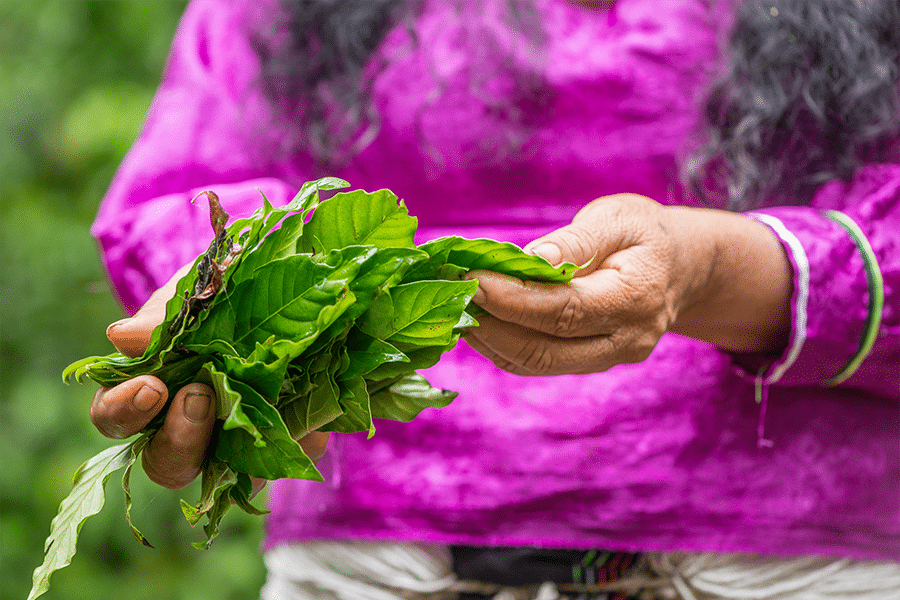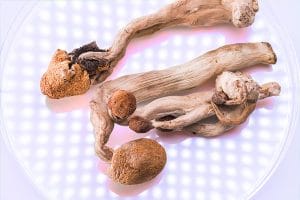Maria, who lives in Portugal and holds plant medicine ceremonies in several countries, got an unexpected call from the police one day informing her that customs was holding ayahuasca shipped to her from Peru, and she was being charged with international trafficking. Unsure what to do, she called the Ayahuasca Defense Fund (ADF), which provides support to people facing legal repercussions for serving ayahuasca and other plant medicines.
The ADF’s human rights lawyer, Natalia Rebollo, got back to Maria with some legal defenses she could use when she spoke to police, the opinion of another lawyer who works with the organization, and the words of a university professor defending ayahuasca as something natural and medicinal. Maria also got her own lawyer, who advised her not to comment officially to the police.
Maria went to the police office, where she confirmed that the ayahuasca was indeed hers and that she knew what it was. “He asked ‘Are you nervous?’ and I said, ‘Yes, I’m really nervous because I dedicate my life to helping people, and this is the first time I am called here,’” she remembers. “He said, ‘You are charged with international trafficking. Even if you don’t consider it a drug, in our law, we consider it a drug.’” As her lawyer advised, she chose not to officially comment.
She was allowed back home and told she’d be called back, but then received a letter from the court saying her case had been archived, which means the investigation had ended and she was released from charges. Usually, when a case gets archived, it’s because insufficient evidence is found to convict someone, which Maria chalks up to her decision not to do the official comments. While she never needed to go to court to defend herself, knowing she was armed with the appropriate defenses helped her manage the stress of waiting to see what would happen with the case. Many people aren’t as equipped.
Read: The Ayahuasca Privilage
Since 2010, the Ayahuasca Defense Fund—which is part of the International Center for Ethnobotanical Education, Research, and Service—has assisted with 129 legal incidents in 28 countries, according to Rebollo. Some of these incidents escalate to formal legal processes, but sometimes, the information that the ADF gives prosecutors convinces them not to go forward with the case. If they end up going to court, the ADF provides testimonies, sends experts to the trial, or gathers expert reports to use as evidence. The ADF operates on donations and offers its services free to the community, though each defendant secures and pays for their own legal council.
Often, Rebollo uses the defense that ayahuasca is not a federally controlled substance in most countries, except in France and the Netherlands; it’s DMT that is, and ayahuasca actually doesn’t contain a lot of DMT. Sometimes, she has studies done to measure the DMT concentration of the ayahuasca to prove this point. While the exact DMT percentage depends on the brew, these studies often debunk the assumption that the amount of DMT equals the amount of ayahuasca. She also works on proving that whatever drug has been found is not a danger to public health. In fact, the ADF created a report documenting research findings on the benefits of ayahuasca and conducted a study on the positive health outcomes of people who drink it. In the United States, they also evoke freedom of religion.
How to Grow Shrooms Bundle
Take Both of Our Courses and Save $90!
The ADF has also dealt with cases related to other medicines like ibogaine and peyote, with much of their work right now concentrated in the U.S., Spain, and the Netherlands. Most of their clients are found by police when traveling with their medicines abroad or receiving them through mail, and then they call them for help.
San Francisco independent attorney Alexis Briggs, who has worked on over a hundred cases involving cannabis, psilocybin, and other plant medicines, has also seen cases where people have been exposed by recipients of the substances they were serving—or people paid by police to pose as such. She represented Dimitri Mugianis, an ibogaine provider who was arrested after being lured to Seattle for a session with a woman who was paid by police to pose as a client. He evaded jail time by arguing for his right to serve ibogaine on grounds of religious freedom, as the substance is part of the Bwiti religion in Gabon, where he was trained, and the judge let him off with 45 days of house arrest.
“[The judge] said, ‘I don’t know what Bwiti is, but I don’t need to know—it’s your religion,” Mugianis remembers. ”They had this idea that I would have to do 300 hours of community service. He said, ‘I’m looking at what these defendants do in the community, and I don’t see a reason for community service. It would take away from the community service they’re already doing. I believe they were doing this for society and human good.’”
Why do people face so much backlash for work that is geared toward helping people? Briggs believes that religious, racial, and cultural discrimination is at the heart of many of these cases. “Most of the examples of why a particular medicine is criminalized, it’s to separate people of different faiths from their sacraments,” she says. “You see this with the Catholic church, with the communion and often, they offer a small sip of wine at the eucharist to people under 21, but this is a religious practice. It’s often in Judeo-Christian circumstances that we don’t identify that that’s what’s happening.”
Read: A Brief Heritage of Ayahuasca Art
Indigenous people lack legal protection when it comes to practicing their spiritual customs, says Rebollo. The United Nations Declaration on the Rights of Indigenous Peoples theoretically allows them to use the medicines that are part of their cultural traditions, but this is merely a declaration and hence not legally binding. “Speaking about colonization, the only treaty that talks about indigenous rights is a declaration, not a treaty,” she says. (A treaty actually requires participants to pass legislation around it; a declaration is simply a statement.)
Not only are the religious rights of indigenous people neglected, but Rebollo believes these people are often actively profiled, meaning that non-indigenous people who serve plant medicine—and often don’t have proper knowledge of the traditions they’re representing—are more likely to get away with it. “Whenever you’re in the airports, you see if you come from Colombia or your flight comes from Peru or Brazil or Mexico, there’s triple surveillance,” she says. “And, of course, a person who doesn’t speak the language, who maybe hasn’t traveled, and who is not dressed as any other traveler of course is going to be double-checked.”
She’s seen people from Bolivia and Peru in particular get in trouble for transporting the coca leaf—a plant that’s used to make cocaine but, in pure form, is not strong and is used in a similar way to coffee in these countries. This is one of the few substances that’s scheduled under international law, and airport officials sometimes assume people are carrying these leaves to make cocaine when, in reality, a kilo of coca leaves would not even constitute a gram of cocaine. “I don’t know if it’s a racial thing or a cultural thing, but it’s really hard making people understand the importance of the coca leaf,” says Rebollo. “This is something that makes us think about the importance of bringing more stipulation into our cultural differences.”
It’s not just indigenous medicine people who can be targets of discrimination by police. Sara Glatt, an ibogaine provider in the Netherlands who was just released from prison after four and a half years, believes she was targeted in an “extremely aggressive” way because she was a woman and an immigrant from Israel. A heroin addict who was on methadone came to her for treatment and had a fatal asthma attack after an assistant gave her a microdose of iboga, according to Dana Beal, a drug policy activist who has helped Glatt set up treatments. It was not clear that the iboga caused the asthma attack, and there’s research suggesting that deaths temporally associated with iboga are not always caused by it, especially when other drugs are involved. Nevertheless, Glatt was arrested without a warrant and taken into custody without being given a public defender and sentenced to eight years in prison.
“The judges didn’t even look at the positive effect on people who witnessed it as a miracle cure for their addiction,” says Glatt. “They don’t look at those things on the positive side—they just say, ‘We want this woman in jail, so we’re going to do that.’” When she appealed, the judges brought up the fact that she wasn’t Dutch as a reason to keep her locked up. She kept appealing until she finally got a court order allowing her to leave.
At the very least, medicine providers hope to see drug laws reflect a greater knowledge of the nuances of different substances. For instance, some U.S. cities such as Santa Cruz, Oakland, and Ann Arbor have decriminalized plant-based entheogens, in alignment with the Decriminalize Nature movement.
Maria says she hopes to see all plant medicine legalized and regulated by institutes consisting of indigenous people as well as medical professionals. “I believe that we need to educate the police and the justice ministry,” says Maria. “All the recoveries that we see, all the second chances that people have, all the healing… we are not criminals.” She also believes we should have better education and training for people who want to use or serve plant medicine so that everything is done safely, and legal intervention will become even less necessary. “We need to see if we can gather forces and promote good work, proper work, safe work, professional work, combining science and ancient wisdom.”
Rebollo is already beginning to see societal attitudes around plants like ayahuasca shift. Last year, the ADF helped with a case in Spain involving a man who had ordered ayahuasca that was seized in customs. It ultimately ended with an acquittal because the judge recognized that ayahuasca was not a controlled substance. “Whenever we get a [legal ruling] that says ‘this is not a controlled substance; this is actually good for public health; it should be protected,’ this is what makes my heart explode,” she says. “It means the way we’re shifting drug policy is through legal cases, so I see each legal case as an opportunity to educate.”
Interested in having a psychedelic experience, but don't know where to start? Get our definitive guide on trusted legal retreat centers, clinical trials, therapists, and more.
We started DoubleBlind two years ago at a time when even the largest magazines and media companies were cutting staff and going out of business. At the time we made a commitment: we will never have a paywall, we will never rely on advertisers we don’t believe in to fund our reporting, and we will always be accessible via email and social media to support people for free on their journeys with plant medicines.
To help us do this, if you feel called and can afford it, we ask you to consider becoming a monthly member and supporting our work. In exchange, you'll receive a subscription to our print magazine, monthly calls with leading psychedelic experts, access to our psychedelic community, and much more.



